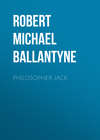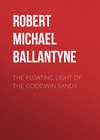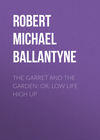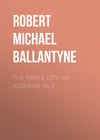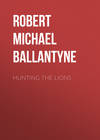Loe raamatut: «Martin Rattler», lehekülg 13
Chapter Twenty Seven
The Old Garret
Days, and weeks, and months, passed away, and Martin had searched every nook and corner of the great sea-port without discovering his old aunt, or obtaining the slightest information regarding her. At first he and Barney went about the search together, but after a time he sent his old companion forcibly away to visit his own relatives, who dwelt not far from Bilton, at the same time promising that if he had any good news to tell he would immediately write and let him know.
One morning, as Martin was sitting beside the little fire in his lodging, a tap came to the door, and the servant girl told him that a policeman wished to see him.
“Show him in,” said Martin, who was not in the least surprised, for he had had much intercourse with these guardians of the public peace during the course of his unavailing search.
“I think, sir,” said the man on entering, “that we’ve got scent of an old woman wich is as like the one that you’re arter as hanythink.”
Martin rose in haste, “have you, my man? Are you sure?”
“’Bout as sure as a man can be who never seed her. But it won’t take you long to walk. You’d better come and see for yourself.”
Without uttering another word, Martin put on his hat, and followed the policeman. They passed through several streets and lanes, and at length came to one of the poorest districts of the city, not far-distant from the shipping. Turning down a narrow alley, and crossing a low dirty-looking court, Martin’s guide stopped before a door, which he pushed open and mounted by a flight of rickety wooden stairs to a garret. He opened the door and entered.
“There she is,” said the man in a tone of pity, as he pointed to a corner of the apartment, “an’ I’m afeer’d she’s goin’ fast.”
Martin stepped towards a low truckle-bed on which lay the emaciated form of a woman covered with a scanty and ragged quilt. The corner of it was drawn across her face, and so gentle was her breathing that it seemed as if she were already dead. Martin removed the covering, and one glance at that gentle, careworn countenance sufficed to convince him that his old aunt lay before him! His first impulse was to seize her in his strong arms, but another look at the frail and attenuated form caused him to shrink back in fear.
“Leave me,” he said, rising hastily and slipping half a sovereign into the policeman’s hand; “this is she. I wish to be alone with her.”
The man touched his hat and retired, closing the door behind him; while Martin, sitting down on the bed, took one of his aunt’s thin hands in his. The action was tenderly performed, but it awoke her. For the first time it flashed across Martin’s mind that the sudden joy at seeing him might be too much for one so feeble as Aunt Dorothy seemed to be. He turned his back hastily to the light and with a violent effort suppressed his feelings while he asked how she did.
“Well, very well,” said Aunt Dorothy, in a faint voice. “Are you the missionary that was here long ago? Oh! I’ve been longing for you. Why did you not come to read to me oftener about Jesus? But I have had him here although you did not come. He has been saying ‘Come unto me, ye that labour and are heavy laden, and I will give you rest.’ Yes, I have found rest in Him.” She ceased and seemed to fall asleep again; but in a few seconds she opened her eyes and said, “Martin, too, has been to see me; but he does not come so often now. The darling boy used always to come to me in my dreams. But he never brings me food. Why does no one ever bring me food? I am hungry.”
“Should you like food now, if I brought it to you?” said Martin in a low voice.
“Yes, yes; bring me food,—I am dying.”
Martin released her hand and glided gently out of the room. In a few minutes he returned with a can of warm soup and a roll; of which Aunt Dorothy partook with an avidity that showed she had been in urgent need. Immediately after, she went to sleep; and Martin sat upon the bed holding her hand in both of his till she awoke, which she did in an hour after, and again ate a little food.
While she was thus engaged the door opened and a young man entered, who stated that he was a doctor, and had been sent there by a policeman.
“There is no hope,” he said in a whisper, after feeling her pulse; “the system is quite exhausted.”
“Doctor,” whispered Martin, seizing the young man by the arm, “can nothing save her? I have money, and can command anything that may do her good.”
The doctor shook his head. “You may give her a little wine. It will strengthen her for a time, but I fear there is no hope. I will send in a bottle if you wish it.”
Martin gave him the requisite sum, and in a few minutes the wine was brought up by a boy.
The effect of the wine was wonderful. Aunt Dorothy’s eyes sparkled as they used to do in days of old, and she spoke with unwonted energy.
“You are kind to me, young man,” she said, looking earnestly into Martin’s face, which, however, he kept carefully in shadow. “May our Lord reward you.”
“Would you like me to talk to you of your nephew?” said Martin; “I have seen him abroad.”
“Seen my boy! Is he not dead?”
“No; he is alive, and in this country, too.”
Aunt Dorothy turned pale, but did not reply for a few minutes, during which she grasped his hand convulsively.
“Turn your face to the light,” she said faintly.
Martin obeyed, and bending over her whispered, “He is here; I am Martin, my dear, dear aunt—”
No expression of surprise escaped from Aunt Dorothy as she folded her arms round his neck, and pressed his head upon her bosom. His hot tears fell upon her neck while she held him, but she spoke not. It was evident that, as the strength infused by the wine abated, her faculties became confused. At length she whispered,—“It is good of you to come to see me, darling boy. You have often come to me in my dreams. But do not leave me so soon; stay a very little longer.”
“This is no dream, dearest aunt,” whispered Martin, while his tears flowed faster; “I am really here.”
“So you always say, my darling child; but you always go away and leave me. This is a dream, no doubt like all the rest; but oh, it seems very very real! You never wept before, although you often smiled. Surely this is the best and brightest dream I ever had!”
Continuing to murmur his name while she clasped him tightly to her bosom, Aunt Dorothy gently fell asleep.
Chapter Twenty Eight
Conclusion
Aunt Dorothy Grumbit did not die! Her gentle spirit had nearly fled; but Martin’s return and Martin’s tender nursing brought her round, and she gradually regained all her former strength and vigour. Yes, to the unutterable joy of Martin, to the inexpressible delight of Mr Arthur Jollyboy and Barney, and to the surprise and complete discomfiture of the young doctor who shook his head and said, “There is no hope,” Aunt Dorothy Grumbit recovered, and was brought back in health and in triumph to her old cottage at Ashford.
Moreover, she was arrayed again in the old bed-curtain chintz with the flowers as big as saucers, and the old high-crowned cap. A white kitten was got, too, so like the one that used to be Martin’s playmate, that no one could discover a hair of difference. So remarkable was this, that Martin made inquiry, and found that it was actually the grand-daughter of the old kitten, which was still alive and well; so he brought it back too, and formally installed it in the cottage along with its grandchild.
There was a great house-warming, on the night of the day, in which Aunt Dorothy Grumbit was brought back. Mr Arthur Jollyboy was there—of course; and the vicar was there; and the pursy doctor who used to call Martin “a scamp;” and the schoolmaster; and last—though not least Barney O’Flannagan was there. And they all had tea, during which dear Aunt Dorothy smiled sweetly on everybody and said nothing—and, indeed, did nothing, except that once or twice she put additional sugar and cream into Martin’s cup when he was not looking, and stroked one of his hands continually. After tea Martin related his adventures in Brazil, and Barney helped him; and these two talked more that night than any one could have believed it possible for human beings to do, without the aid of steam lungs! And the doctor listened, and the vicar and schoolmaster questioned, and old Mr Jollyboy roared and laughed till he became purple in the face—particularly at the sallies of Barney. As for old Aunt Dorothy Grumbit, she listened when Martin spoke. When Martin was silent she became stone deaf!
In the course of time Mr Jollyboy made Martin his head clerk; and then, becoming impatient, he made him his partner off-hand. Then he made Barney O’Flannagan an overseer in the warehouses; and when the duties of the day were over, the versatile Irishman became his confidential servant and went to sup and sleep at the Old Hulk; which, he used to remark, was quite a natural and proper and decidedly comfortable place to come to an anchor in.
Martin became the stay and comfort of his aunt in her old age; and the joy which he was the means of giving to her heart was like a deep and placid river which never ceases to flow. Ah! there is a rich blessing in store for those who tenderly nurse and comfort the aged, when called upon to do so; and assuredly there is a sharp thorn prepared for those who neglect this sacred duty. Martin read the Bible to her night and morning; and she did nothing but watch for him at the window while he was out. As Martin afterwards became an active member of the benevolent societies, with which his partner was connected, he learned from sweet experience that, “it is more blessed to give than to receive,” and that, “it is better to go to the house of mourning than to go to the house of feasting.” Dear young reader, do not imagine that we plead in favour of moroseness or gloom. Laugh if you will, and feast if you will, and remember, too, that, “a merry heart is a continual feast;” but we pray you not to forget that God himself has said that a visit to the house of mourning is better than a visit to the house of feasting: and, strange to say, it is productive of greater joy; for to do good is better than to get good, as surely as sympathy is better than selfishness.
Martin visited the poor and read the Bible to them; and in watering others he was himself watered, for he found the “Pearl of Great Price,” even Jesus Christ the Saviour of the world.
Business prospered in the hands of Martin Rattler, too, and he became a man of substance. Naturally, too, he became a man of great importance in the town of Bilton. The quantity of work that Martin and Mr Jollyboy and Barney used to get through was quite marvellous; and the number of engagements they had during the course of a day was quite bewildering.
In the existence of all men, who are not born to unmitigated misery, there are times and seasons of peculiar enjoyment. The happiest hour of all the twenty-four to Martin Rattler was the hour of seven in the evening; for then it was that he found himself seated before the blazing fire in the parlour of the Old Hulk, to which Aunt Dorothy Grumbit had consented to be removed, and in which she was now a fixture. Then it was that old Mr Jollyboy beamed with benevolence, until the old lady sometimes thought the fire was going to melt him; then it was that the tea-kettle sang on the hob like a canary; and then it was that Barney bustled about the room preparing the evening meal, and talking all the time with the most perfect freedom to any one who chose to listen to him. Yes, seven p.m. was Martin’s great hour, and Aunt Dorothy’s great hour, and old Mr Jollyboy’s great hour, and Barney’s too; for each knew that the labours of the day were done, and that the front door was locked for the night, and that a great talk was brewing. They had a tremendous talk every night, sometimes on one subject, sometimes on another; but the subject of all others that they talked oftenest about was their travels. And many a time and oft, when the winter storms howled round the Old Hulk, Barney was invited to draw in his chair, and Martin and he plunged again vigorously into the great old forests of South America, and spoke so feelingly about them that Aunt Dorothy and Mr Jollyboy almost fancied themselves transported into the midst of tropical scenes, and felt as if they were surrounded by parrots, and monkeys, and jaguars, and alligators, and anacondas, and all the wonderful birds, beasts, reptiles, and fishes, that inhabit the woods and waters of Brazil.











